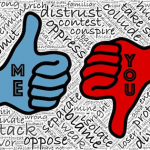
REBECCA BRATTEN WEISS, blogger at Suspended in her Jar (Catholic): Given recent news, I’d like to talk about how we’ve each experienced our community’s response to sexual assaults and excuses/cover-ups for sexual assaults?
I know everyone’s probably sick of politics and the name of Trump at this point, but I can’t stop addressing this issue because it’s making me a little ill. Talking it out with others is at least some catharsis, and I think it really showcases some serious problems in our supposedly respectable circles.
SAMAR KAUKAB, executive director of Arete at the University of Chicago (Muslim): I agree. As the nation is examining and analyzing how we got to this point with Trump and the related issues of sexual violence, how do we connect this back to the other ‘Trumps’ in our lives? I’ve been concerned that people are looking at Trump with horror and not necessarily connecting the idea that this is exactly how it happens — how entire communities cover up and overlook sexual violence. I think this really connects to cases in faith communities in particular given the Trump-like associations of power and influence that faith leaders often have.
Rebecca: Definitely. We can’t pretend that Trump is some isolated concentration of toxic masculine privilege when so many people defending him — including men of faith — are presuming that this is normal, and we’re just freaking out for no reason, hysterical women that we are. I like the idea of the other ‘Trumps’ in our lives. Well I don’t like it, but it’s a valuable realization.
LIBBY ANNE, blogger at Love, Joy, Feminism (atheist): This is actually something rather near and dear to me — that’s a horrid way to put it though — because of everything I’ve written about Bill Gothard over the past few years on my blog. The similarities are striking. He could get away with groping women — girls, in many cases — because he knew they wouldn’t report it. He was a powerful religious leader, he was respected and loved, he was BILL GOTHARD. Who would even believe them? In many ways, what happened in Trump’s case is similar — he was rich and a celebrity, how do you stand up against that, how do you report those situations?
There’s also the problem of being connected — in some cases the women who have accused Trump were his employees, or in some way worried that he had some pull with their employers. With Gothard it was the same — his victims were often his personal assistants or secretaries. People need to understand these power structures and why women don’t always report, and how men get away with it, and the role religion, money, or celebrity can play in it.
Samar: I think that’s exactly right, based on my experiences in dealing with similar abuses of power and influence within Muslim communities. I think it’s fascinating to draw parallels between the ways in which members of the Republican Party are looking at Trump’s behaviors — are acknowledging that it’s abhorrent — yet are willing to still back him because they are evaluating that their party goals are more important. I see so many similar patterns in the ways that community leaders and members are often willing to overlook patterns of abuse due to the ‘calculations’ that they project are in the greater interest of the institution involved, or even the community itself. But it’s fascinating that this is what’s destroying his campaign. That is the irony in all of this.
Libby Anne: Samar, I’ve also seen the calculated aspect you’re talking about — when a religious leader offends, his defenders talk about the importance of his ministry, about all the souls it has won, about the importance of protecting the image of the congregation or ministry, etc.
Rebecca: I’ve seen this too. Preference for an institution over the wellbeing of an individual life is almost the norm, and as a Christian this appalls me. It’s the rationale for cover-ups of sexual assault at educational institutions — even threats of expulsion, should women report assault. The idea that the end justifies the means is theoretically denounced as utilitarian, and yet this is the principle that’s being acted on. This attitude coming from religious leaders who are involved in the pro-life movement has been especially damning, because they seem to imply that women’s rights and dignity just don’t matter compared with a theoretic pro-life principle that is laughably now represented by someone with zero respect for lives at all.
Libby Anne: I did want to note real quick that the situation with Trump makes it clear that it’s not just religious communities that have this problem. Several years ago, women in astronomy began coming forward about a specific professor, enough of them that action was taken, and many people were very upset by this, arguing that it would ruin this astronomer’s career and the findings he might have made. Think of the science! Don’t let these other things get in the way of the science! Just as with Trump, it’s all about Supreme Court nominees or what have you. This sort of thing can happen in any community.
There are some factors in religious communities — at least in evangelical ones — that tend to make it worse in some aspects, though. There’s an emphasis on forgiving the perpetrator, and this idea that repentance can basically make it all go away, and then you can let the perpetrator retain (or regain) his position. There’s more in evangelicalism about women being temptresses, too. I suspect this depends on the specific theology.
Rebecca: Then there are the excuses made for male celebrities who are guilty not just of sexual assault but of pedophilia. I think having a “tribe” already conditions one to make excuses and cover-ups. But it’s so true that religion can easily be twisted so that rituals of forgiveness end up providing license for the abuser, and putting victims into places where they’re forced to forgive or else fail as Christians. Obviously as a Catholic this whole topic is incredibly painful and angering, because I’ve seen all these horrible stories of abuse come out, and because priests were revered or beloved they were just shifted around from place to place.
Samar: Has either of you seen any creative accountability in situations like this in your communities?
Rebecca: In my experience, when there is a complaint to be made to a bishop, it never seems to get through to him. So accountability really only works so long as those in the network are taking seriously their spiritual responsibility.
Libby Anne: I’ve seen more evangelical churches change their rules vis-à-vis their Sunday school programs, requiring background checks for teachers, requiring that there always be two teachers present, and so on. Unfortunately, it’s much harder to provide accountability for pastors within evangelicalism, because it tends to be so church-by-church. Often there isn’t even a denomination. Each church is an individual pastor’s kingdom. Who can provide accountability for the king?
Samar: I also agree with your earlier point, Libby, that these issues exist elsewhere too. I’ve seen multiple examples of this in the higher ed landscape, so I really appreciate your example of the way this problem has been mishandled even in scientific communities.
As for the blending of the element of spiritual power and sexual violence, I think that often becomes very particular and challenging about addressing these issues in faith communities. In American Muslim communities, there is often a sense of adab (respect) invoked for those with religious or spiritual authority. These men, who are holders of knowledge, invoke a special closeness to God. So then to confront or raise abuse becomes doubly hard. Not only is a community member taking on the very difficult task of coming forward, but they also risk losing their standing within the faith community itself.
Rebecca: This is one of so many reasons why I feel that religious communities require female leadership, as well as a cultivation of theologies that don’t reduce female-ness to some inferior place, or put us into an ivory box on a pedestal, either. Yet the irony is that when I say this, many in my faith community gasp and think, “She’s promoting women’s ordination!” – which would shock them more than endorsing a man who has openly boasted of sexual assault. I wish we had powerful abbesses and prioresses, as in Medieval Ireland.
Libby Anne: This has also played out in the organized atheist community. We’re talking about an informal network that includes blogs, speakers, conferences, student groups at various colleges, local meet-up groups, and so on, and this community has dealt with these problems too. I mentioned earlier that there are some particular aspects of evangelicalism that make handling sexual assault and abuse more difficult, but there are some aspects of the skepticism embraced in organized atheist communities that do the same. Namely, women have been asked to show “proof” that this person or that is dangerous or has assaulted women or acted inappropriately. There’s a standard of evidence demanded that isn’t workable for things like this, and women who object are called irrational and dismissed. This idea that we can elevate “logic” and “reason” without considering the various factors involved in situations like this is a real problem. The result is that, in many cases, women have resorted simply to warning other women away from this individual or that, because speaking up any more publicly might get them driven out of the movement.
ERIN WATHEN, blogger at Irreverin (Progressive Christian): Hi all. I’m here now. Sorry to be late!
I will say an amen and hell yes to Rebecca’s sentiment: this is why we MUST have women in leadership at every level of religious life. As long as there are domains viewed as “men only,” and those domains are protected by dogma and institutional whatever, then it will be acceptable to have a ‘men only’ mentality in other areas of public life as well. And that ultimately amounts to the “locker room” kind of excuses for sexual harassment and assault. The message is, “This is what men do when we’re alone, and you don’t know/can never understand.”
I have been filled with latent feminist rage these past few weeks, fighting fights I did not think we had to fight any more. I’m exhausted.
Rebecca: Me too, Erin. I feel deeply betrayed by people whom I thought I could trust, in spite of ideological differences. I’m trying to figure out whether they’re basically decent people who have been brainwashed, or whether there was always moral toxicity beneath the gleaming veneer. The ethical element — on the level of evaluating ethos, character — is making me rethink a lot of what goes into our acceptance of leadership.
Samar: I’m really interested in further probing this idea about the ways in which requests for arbitrary standards for ‘evidence’ of sexual abuse and violence within communities are often used as a mechanism to silence victims from coming forward. And when victims are left in so-called gray zones, how can community members protect themselves? As faith communities, is this not our responsibility to expressly say that sexual abuse and violence are immoral and wrong?
And yes, yes, yes, this all leads to the role of women and their capacity to occupy meaningful leadership positions. But in the meantime, it’s very difficult to stay engaged in communities that effectively operate in much the same way that many Trump supporters are with respect to his issues of sexual assault. It’s very difficult to even want to come back or find a spiritual home. So in some strange way, this campaign season has brought back very painful feelings of betrayal by my co-religionists and the institutions that are supposed to protect us all. Its painful to see the exact same thing happening. It’s identity-shaking.
Libby Anne: One thing I’ve been thinking about, re your comment Erin about feeling betrayed, is that many evangelicals in particular are held hostage, in a sense, to the abortion issue. And it’s not even as simple as that. There are quite a few ways to decrease abortion outside of banning it. It’s as though these evangelicals will only vote for candidates that show proper moral outrage, completely regardless of whether their policies will actually decrease abortions. But regardless, I think some evangelicals who are voting for Trump are doing so solely over this one issue, completely regardless of everything else, while others who are voting for him may have similar reasons but also make excuses for his behavior.
It’s the excuse-making that is most disappointing to hear as a woman, but the other phenomenon — the way in which one specific issue can make evangelicals willing to overlook so many problems, including sexual assault — is just as insidious. That gets back to a comment earlier — the way in which protecting a ministry’s witness can become more important than holding its leaders accountable for sexual abuse and harassment.
 Erin: I know. Which is SO IRONIC, to think that he cares about this issue at all. I mean, it has to do with women and their body parts. Not exactly a topic that he’s shown great reverence for. The pandering is so obvious. How do the people who care so deeply about the issue not care enough about it to see that he’s pandering? It is a pretty sick game.
Erin: I know. Which is SO IRONIC, to think that he cares about this issue at all. I mean, it has to do with women and their body parts. Not exactly a topic that he’s shown great reverence for. The pandering is so obvious. How do the people who care so deeply about the issue not care enough about it to see that he’s pandering? It is a pretty sick game.
I read an interesting article the other day about how this campaign has caused a rift within the Evangelical movement that will not be easily healed once the election is over. On one side you’ve got women, Millennials and people of color… on the other side, the Trump apologists. And once the election is over, they are still going to have to deal with all the divisions that have been revealed within their own movement (much like the GOP).
The bottom line is, there is a growing voice within Evangelicalism that wants to move away from the dogmatic fights over gay marriage and abortion and focus instead on climate change, immigration, poverty, and so on. Which made me think… gee, they are basically progressive mainliners who like praise music! We can work with that.
Rebecca: Yes, it’s driving me nuts, because some friends and I — some of whom have been involved in the pro-life movement for years — decided we had enough of what the mainstream movement has done, utterly throwing women under the bus. How dare they claim that they have our rights and wellbeing at heart! So we just started the “new pro-life movement” which is focused on a consistent life ethic, providing social safety nets and eliminating abuse to decrease the demand for abortion. And we’re already being attacked for — get this — emphasizing saving lives instead of adhering to the principle! Speaking of putting rules before lives….
Samar: I wonder a lot about the role of women following earth-shattering incidents like what has been uncovered about Trump. How do you ever come back to a community knowing that some other institutional or party goal matters more than the sanctity of your body and your safety? I don’t know what issue is more core to our humanity than that.
Erin: Samar. I’ve been thinking the same thing. And yet, women are sticking by him, defending him even. But, there are other women who are leaving the party over this. And their churches, I hope.
Libby Anne: Rebecca, I’ve read that teens are actually having sex LESS today than in past generations. I actually think part of the reason for that is the emphasis on consent. I often see religious individuals concerned that focusing on consent will make teens all go out and have sex, but in fact it also gives them permission to say “no”. Teaching women to take control of their own bodies and make their own decisions based on good information and long-term thinking ought to, in practice, reduce the unintended pregnancy rate, as you’ll have fewer teenage girls pressured into sex they’d rather not be having. (Which isn’t to erase all the teenage girls having sex they do want to be having, of course.) It’s one of the ways in which patriarchy plays into issues like abortion that we don’t always talk about.
Rebecca: This is so very true. I remember how nuts it was in the 80s — it seemed like everyone was having sex with everyone. And women have it drilled into us that our value depends so much on our sexuality. In conservative circles, that means marry and have kids. In many secular circles, it means have lots of sex to show how liberated you are. As a teacher of women’s literature, I noticed the irony of how many texts about female liberation end up with women finding liberation in the arms of a man. So women are often afraid to say no, afraid to choose to be single, because it wipes out their supposed value as women.
Samar: Libby, the facts that you point out highlight that if we had more women in authority positions and able to point out facts, lived experiences, and God forbid, even research, that could help community members and leaders make better decisions, and things might be different. Unfortunately, information alone isn’t enough to convince people about what is actually good for them or even rational. So the question always comes back to this: as feminists of faith, how can we nudge our respective faith communities to move in healthier and safer directions?
Libby Anne: As a nonreligious individual, and someone with a foot in organized atheism, I think one thing we have got to do in our community is be consistent. I often see atheists almost gleeful over sex abuse scandals in religious communities who then turn around and present a skeptical face to accusations of similar abuse in their own communities. I find this maddening. We have to hold consistent standards.
Beyond this, I think the greater awareness of sexual assault and sexual harassment and the various issues involved is critically important. In many cases that means men need to listen to the women around them, because as men, there are things they simply won’t see. Listening to women is so key, and for a long time organized atheism has been dominated by men, both at the leadership and the lay level, which can make listening hard.
Samar: Yes! I find this to be particularly an issue in the way many Americans view issues of sexual violence within Muslim communities. In particular, many within the new atheist movement have had a field day with incidences of sexual abuse or the broad treatment of women in Muslim communities as if these issues are some kind of anomaly. These sentiments display a latent or even express racism and xenophobia that is utterly horrifying. The irony in pushing a white-savior feminism at the expense of racism never fails to completely disgust me. It’s also maddening in that it completely erases the efforts of women and others within communities who are engaging in the very real and difficult work of addressing these issues.
Perhaps the most recent public incidence of this has been in France with the recent burkini ban. As if French liberalism removing women’s agency to make their own choices about what they do or don’t wear is a step in the right direction as it relates to feminism or individual liberty.
Libby Anne: Ack, YES Samar, so much that! There has to be an understanding that this isn’t just a problem OTHER groups experience, that it’s a problem our in-group experiences, too. One problem I see with organized atheism is that there is often ONLY an interest in women’s issues when it’s a way to stick it to Muslims or evangelicals, and you’re absolutely right, that there is often racism and xenophobia at play there. It’s maddening that outside of this context, many men within organized atheism just don’t want to talk about women’s issues. They argue that women’s issues are separate from the issues the secular movement should be focused on, or they apply a twisted standard of evidence. I’ve even seen individuals argue that women are naturally more irrational, more suited for helping professions than for the hard work of science, etc. But then, when someone in a Muslim community abuses a woman, all of a sudden they’re all about caring about women.
Samar: And of course the pendulum swings the other way from within Muslim communities as well. So in some ways it feels endless.
Rebecca: As a Catholic, one thing I emphasize is taking a second look at the life of Mary and the saints, seeing them not as these mild submissive little wisps of femininity but as powerful persons who dared to approach God, to strive for personal encounter with ultimate things without going through preset patriarchal channels.
I think another thing we need to do is exactly what we’re all doing right here: reaching across dividing lines of belief and finding common ground as women with shared experiences and values. And yes, the whole scapegoating of other groups has to stop. I’m so tired of people acting as though sexual assault in Christian circles isn’t a big deal and then demonizing Muslims, especially Muslim men.
I saw a very telling political cartoon about the burkini ban: one man forcing a woman into a burkini, another man pulling it off. Image of female body as territory for colonization by political patriarchal ideology.
Samar: Absolutely. And it really does come back to this idea about women’s bodies and what agency is. For me, if our bodies are not safe, if our choices are not our own, then I don’t think I can come to the table to discuss anything else about my identity as a member of a faith community.
Libby Anne: If I may say one last thing, with regards to your comment, Samar: I think many women within organized atheism and beyond have embraced new ideas about consent, autonomy, sexuality, and so on, and then been disappointed when these ideas aren’t reflected in their partners (we’re talking heterosexual women). And there’s a frustration. I see it sometimes in organized atheism, you know, we’re progressive, we’re enlightened, and still — STILL — the men around me treat me like this?
Interestingly, this isn’t a new phenomenon. The women’s movement of the 1970s was born in the late 1960s when women within the civil rights movement and New Left became frustrated with the troglodyte behavior of their male counterparts. They were like, we’ve come so far, and STILL this?!
So some of what we do has to be aimed at educating boys and men. We women can be as awakened as all get out and still feel like we’re ramming our heads into the wall unless the men in our lives learn to be awake too.
Samar: Amen to that. All of that.
Rebecca: Well speaking of traditional gender roles, I have to go prepare dinner for my husband and children. I’m even barefoot while doing it! But that’s because I have liberated feet. It’s been so great talking with you all; this conversation has encouraged me in many ways.
Samar: It was such a pleasure hearing from each of you. I feel like there are probably dozens of topics to dive deeper into.
Libby Anne: Good thing we’ll have more conversations in the future!
Images via Shutterstock










